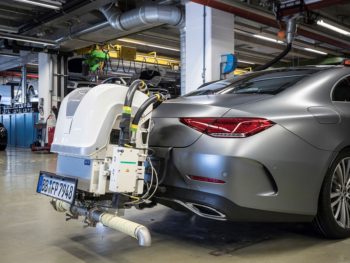EU new car registrations plummet as WLTP kicks in
The switch to the new WLTP test cycle brought a much-anticipated drop for September registrations in the EU, following a bumper August.
Latest figures from the European Automobile Manufacturers Association (ACEA) show new car registrations fell 23.5% last month, with most EU countries suffering double-digit losses, including the five major markets. Figures already published by the UK’s Society of Motor Manufacturers and Traders (SMMT) had shown the overall UK new car market was down 20.5% while fleet registrations last month fell 22.4% compared to September 2017.
It follows August’s 31.2% “exceptional” surge in EU new car registrations – including a 19.7% rise for UK fleet registrations – as carmakers offered major discounts for NEDC-tested vehicles in the run-up to the deadline for the full introduction of the new cycle. Only a limited volume of pre-WLTP cars (2,000 units, or up to 10% of 2017’s volume) can legally be sold after this date, and only if they were built before 1 June, meaning carmakers were keen to push out NEDC-tested stock.
Car buyers, including fleets, were also keen to take up new cars in August to benefit from lower official CO2 emissions for ‘genuine’ NEDC vehicles. Recently published data from Jato showed that the gap is widening between the genuine NEDC figures and the ones for WLTP-tested cars, which are currently being converted back to comparable ‘NEDC Correlated’ ones. Figures generated by the firm in April showed an average 8g/km uplift to NEDC Correlated figures – test data published this summer, regarded as more robust as it included increased vehicle numbers, showed a difference of 9.6g/km.
September’s downturn in registrations was also the result of carmakers’ challenges with getting vehicles tested in time for the September deadline, leaving manufacturer model lists very much reduced in some cases as some models were either temporarily or permanently removed due to WLTP testing issues.
The chief executive of the UK’s SMMT, Mike Hawes, has said that with the industry given barely a year to reapprove the entire European model line-up, bottlenecks and a squeeze on supply came as no surprise and were “exceptional circumstances”.
He added: “The good news is that, as backlogs ease, consumers and businesses can look forward to a raft of exciting high-tech cars and a market keen to recover lost momentum.”
And ACEA figures show that the new car market in the EU remains positive for the first nine months of the year, with the 2.5% rise in line with growth expectations for this year. Looking at the five biggest markets, demand went up in Spain (+11.7%), France (+6.5%) and Germany (+2.4%), while car sales contracted in Italy (-2.8%) and in the United Kingdom (-7.5%).


